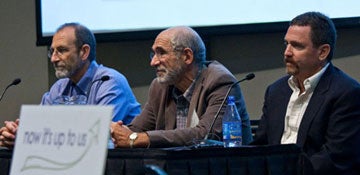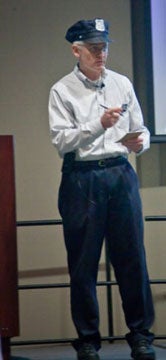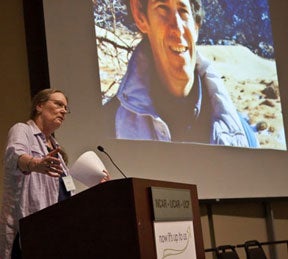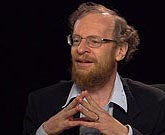Carrying the torch
A year after his death, Steve Schneider and his legacy take center stage
Oct 21, 2011 - by Staff
Oct 21, 2011 - by Staff
Zhenya Gallon | 13 October 2011 • To honor his memory and inspire continuation of his work, about 200 people gathered in late August at NCAR for the 2011 Stephen H. Schneider Symposium.
Colleagues, friends, family members, and former students—from undergraduates to postdocs—reviewed past accomplishments and looked forward as they celebrated Schneider's contributions to research, education, and communication about climate complexity, climate change, and a host of related topics.

Panelists for the session on Schneider's contributions to the IPCC and prospects for its future, from left: Chris Field (Carnegie Institution for Science), Michael Oppenheimer (Princeton University), and Ben Santer (Lawrence Livermore National Lab). (Article photos by Toni Rosati, NCAR.)
Right up to his sudden death in July 2010 at age 65, Schneider was active in teaching and research. He held multiple positions at Stanford University, including Melvin and Joan Lane Professor for Interdisciplinary Environmental Studies and senior fellow in the Woods Institute for the Environment. Schneider's association with NCAR began with a postdoctoral fellowship in 1972, followed by over two decades on its scientific staff. For more on his career, see Stephen Schneider: An extraordinary life.
During the three-day symposium, participants reported on progress, analyzed persistent questions, and identified opportunities for future work in over a dozen areas spanning the physical, social, and educational sides of climate. The themes were largely inspired by Schneider’s prolific writings, including many peer-reviewed articles as well as a number of books for general audiences..
Uncertainty—a key theme of Schneider’s work—was the focus of several talks, from understanding uncertainty in estimates of future climate change to decision making in the face of uncertainty to strategies for improving climate science communication.
Waylaid by a travel-related bug, Rajendra Pachauri, chair of the Intergovernmental Panel on Climate Change, addressed the gathering via recorded video. His remarks were illustrated with several passages from email exchanges to illustrate Schneider's integrity, encouragement, and commitment to the IPCC process. "He was perceptive to a fault," Pachauri recalled.

Richard Moss as "Uncertainty Cop." He and Schneider used to issue "citations" to colleagues participating in the IPCC for "poorly characterized uncertainty."
The symposium offered a mix of standard elements with those not usually found at a scientific meeting, as participants shared memories or told jokes about Schneider and themselves. Longtime colleague Richard Moss made an appearance as half of the "Uncertainty Cop" team (see photo). And some participants played excerpts from classic rock songs with lyrics reflecting an aspect of Schneider's work or the challenges the climate science community continues to face. At the closing-night dinner, a small group of amateur performers led the gathering in "Teach Your Children Well," a song by Graham Nash whose lyrics have become another way of expressing Schneider's legacy.

A photo of Schneider appears on screen behind Linda Mearns, co-organizer and NCAR host of the symposium.
The symposium, whose forward-looking focus was underlined in the motto "Now it's up to us," was organized by Terry Root (Stanford University), Linda Mearns (NCAR), Benjamin Santer (Lawrence Livermore National Laboratory), Jean-Pascal van Ypersele (Catholic University of Louvain), and Christopher Still (University of California, Santa Barbara and NOAA/CIRES).
At the close of the meeting, Mearns summed up its unusual flavor by noting the many connections made between heart and mind, "perhaps the most important type of interdisciplinarity—for Steve, and for us." Now," she said, "it's indeed up to us."
 First Schneider award for
First Schneider award for To honor its namesake’s considerable public outreach legacy, the Stephen H. Schneider Award for Outstanding Climate Science Communication was introduced during the symposium. Greg Dalton named Richard Alley as the inaugural prize recipient on behalf of Climate One, the sustainability initiative of the Commonwealth Club of California. Alley is the Evan Pugh Professor of Geosciences and an associate of the Earth and Environmental Systems Institute at the Pennsylvania State University.
"Stephen Schneider was hugely successful at making science useful to the public, so it is humbling to receive this award in his honor,” said Alley in a Climate One news release.
The annual award was established to recognize "a natural or social scientist who has made extraordinary scientific contributions and communicated that knowledge to a broad public in a clear and compelling fashion." Alley will receive the award in San Francisco on 6 December at the Commonwealth Club of California. The award is underwritten by the ClimateWorks Foundation and energy entrepreneur Michael Haas.
Short coffee break interviews with three panelists
|
|
|
|
|
|